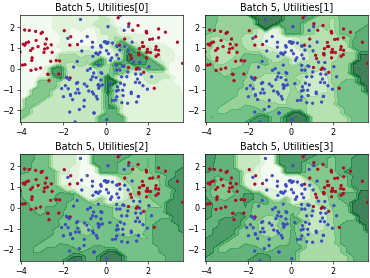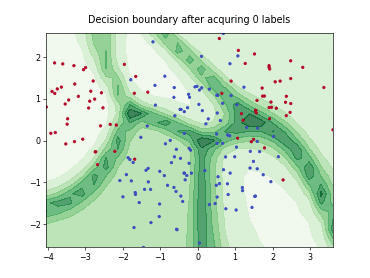skactiveml.classifier.MixtureModelClassifier#
- class skactiveml.classifier.MixtureModelClassifier(mixture_model=None, weight_mode='responsibilities', classes=None, missing_label=nan, cost_matrix=None, class_prior=0.0, random_state=None)[source]#
Bases:
ClassFrequencyEstimatorThe classifier based on a mixture model (MixtureModelClassifier) is a generative classifier based on a (Bayesian) Gaussian mixture model (GMM).
- Parameters
- mixture_modelsklearn.mixture.GaussianMixture or
- sklearn.mixture.BayesianGaussianMixture or None, default=None
(Bayesian) Gaussian Mixture model that is trained with unsupervised algorithm on train data. If the initial mixture model is not fitted, it will be refitted in each call of the ‘fit’ method. If None, mixture_model=BayesianMixtureModel(n_components=n_classes) will be used.
- weight_mode{‘responsibilities’, ‘similarities’},
default=’responsibilities’ Determines whether the responsibilities outputted by the mixture_model or the exponentials of the Mahalanobis distances as similarities are used to compute the class frequency estimates.
- classesarray-like, shape (n_classes), default=None
Holds the label for each class. If none, the classes are determined during the fit.
- missing_labelscalar or str or np.nan or None, default=np.nan
Value to represent a missing label.
- cost_matrixarray-like, shape (n_classes, n_classes)
Cost matrix with cost_matrix[i,j] indicating cost of predicting class classes[j] for a sample of class classes[i]. Can be only set, if classes is not none.
- class_priorfloat or array-like of shape (n_classes), default=0
Prior observations of the class frequency estimates. If class_prior is an array, the entry class_prior[i] indicates the non-negative prior number of samples belonging to class classes_[i]. If class_prior is a float, class_prior indicates the non-negative prior number of samples per class.
- random_stateint or RandomState instance or None, default=None
Determines random number for ‘predict’ method. Pass an int for reproducible results across multiple method calls.
- Attributes
- classes_array-like, shape (n_classes)
Holds the label for each class after fitting.
- class_priornp.ndarray, shape (n_classes)
Prior observations of the class frequency estimates. The entry class_prior_[i] indicates the non-negative prior number of samples belonging to class classes_[i].
- cost_matrix_np.ndarray, shape (classes, classes)
Cost matrix with cost_matrix_[i,j] indicating cost of predicting class classes_[j] for a sample of class classes_[i].
- F_components_numpy.ndarray, shape (n_components, n_classes)
F[j,c] is a proxy for the number of sample of class c belonging to component j.
- mixture_model_sklearn.mixture.GaussianMixture or
- sklearn.mixture.BayesianGaussianMixture
(Bayesian) Gaussian Mixture model that is trained with unsupervised algorithm on train data.
Methods
fit(X, y[, sample_weight])Fit the model using X as training samples and y as class labels.
Get metadata routing of this object.
get_params([deep])Get parameters for this estimator.
predict(X)Return class label predictions for the test samples X.
predict_freq(X)Return class frequency estimates for the input data X.
Return probability estimates for the test data X.
sample_proba(X[, n_samples, random_state])Samples probability vectors from Dirichlet distributions whose parameters alphas are defined as the sum of the frequency estimates returned by predict_freq and the class_prior.
score(X, y[, sample_weight])Return the mean accuracy on the given test data and labels.
set_fit_request(*[, sample_weight])Request metadata passed to the
fitmethod.set_params(**params)Set the parameters of this estimator.
set_score_request(*[, sample_weight])Request metadata passed to the
scoremethod.- fit(X, y, sample_weight=None)[source]#
Fit the model using X as training samples and y as class labels.
- Parameters
- Xmatrix-like of shape (n_samples, n_features)
The samples matrix X is the feature matrix representing the samples.
- yarray-like of shape (n_samples,)
It contains the class labels of the training samples.
- sample_weightarray-like, shape (n_samples,)
It contains the weights of the training samples’ class labels. It must have the same shape as y.
- Returns
- self: skactiveml.classifier.MixtureModelClassifier,
- skactiveml.classifier.MixtureModelClassifier object fitted on the
training data.
- get_metadata_routing()#
Get metadata routing of this object.
Please check User Guide on how the routing mechanism works.
- Returns
- routingMetadataRequest
A
MetadataRequestencapsulating routing information.
- get_params(deep=True)#
Get parameters for this estimator.
- Parameters
- deepbool, default=True
If True, will return the parameters for this estimator and contained subobjects that are estimators.
- Returns
- paramsdict
Parameter names mapped to their values.
- predict(X)#
Return class label predictions for the test samples X.
- Parameters
- Xarray-like of shape (n_samples, n_features)
Input samples.
- Returns
- ynumpy.ndarray of shape (n_samples)
Predicted class labels of the test samples X. Classes are ordered according to classes_.
- predict_freq(X)[source]#
Return class frequency estimates for the input data X.
- Parameters
- Xarray-like of shape (n_samples, n_features)
Input samples.
- Returns
- Farray-like of shape (n_samples, classes)
The class frequency estimates of the input samples. Classes are ordered according to classes_.
- predict_proba(X)#
Return probability estimates for the test data X.
- Parameters
- Xarray-like, shape (n_samples, n_features) or
- shape (n_samples, m_samples) if metric == ‘precomputed’
Input samples.
- Returns
- Parray-like of shape (n_samples, classes)
The class probabilities of the test samples. Classes are ordered according to classes_.
- sample_proba(X, n_samples=10, random_state=None)#
Samples probability vectors from Dirichlet distributions whose parameters alphas are defined as the sum of the frequency estimates returned by predict_freq and the class_prior.
- Parameters
- Xarray-like of shape (n_test_samples, n_features)
Test samples for which n_samples probability vectors are to be sampled.
- n_samplesint, default=10
Number of probability vectors to sample for each X[i].
- random_stateint or numpy.random.RandomState or None, default=None
Ensure reproducibility when sampling probability vectors from the Dirichlet distributions.
- Returns
- Parray-like of shape (n_samples, n_test_samples, n_classes)
There are n_samples class probability vectors for each test sample in X. Classes are ordered according to classes_.
- score(X, y, sample_weight=None)#
Return the mean accuracy on the given test data and labels.
- Parameters
- Xarray-like of shape (n_samples, n_features)
Test samples.
- yarray-like of shape (n_samples,)
True labels for X.
- sample_weightarray-like of shape (n_samples,), default=None
Sample weights.
- Returns
- scorefloat
Mean accuracy of self.predict(X) regarding y.
- set_fit_request(*, sample_weight: Union[bool, None, str] = '$UNCHANGED$') MixtureModelClassifier#
Request metadata passed to the
fitmethod.Note that this method is only relevant if
enable_metadata_routing=True(seesklearn.set_config()). Please see User Guide on how the routing mechanism works.The options for each parameter are:
True: metadata is requested, and passed tofitif provided. The request is ignored if metadata is not provided.False: metadata is not requested and the meta-estimator will not pass it tofit.None: metadata is not requested, and the meta-estimator will raise an error if the user provides it.str: metadata should be passed to the meta-estimator with this given alias instead of the original name.
The default (
sklearn.utils.metadata_routing.UNCHANGED) retains the existing request. This allows you to change the request for some parameters and not others.New in version 1.3.
Note
This method is only relevant if this estimator is used as a sub-estimator of a meta-estimator, e.g. used inside a
Pipeline. Otherwise it has no effect.- Parameters
- sample_weightstr, True, False, or None, default=sklearn.utils.metadata_routing.UNCHANGED
Metadata routing for
sample_weightparameter infit.
- Returns
- selfobject
The updated object.
- set_params(**params)#
Set the parameters of this estimator.
The method works on simple estimators as well as on nested objects (such as
Pipeline). The latter have parameters of the form<component>__<parameter>so that it’s possible to update each component of a nested object.- Parameters
- **paramsdict
Estimator parameters.
- Returns
- selfestimator instance
Estimator instance.
- set_score_request(*, sample_weight: Union[bool, None, str] = '$UNCHANGED$') MixtureModelClassifier#
Request metadata passed to the
scoremethod.Note that this method is only relevant if
enable_metadata_routing=True(seesklearn.set_config()). Please see User Guide on how the routing mechanism works.The options for each parameter are:
True: metadata is requested, and passed toscoreif provided. The request is ignored if metadata is not provided.False: metadata is not requested and the meta-estimator will not pass it toscore.None: metadata is not requested, and the meta-estimator will raise an error if the user provides it.str: metadata should be passed to the meta-estimator with this given alias instead of the original name.
The default (
sklearn.utils.metadata_routing.UNCHANGED) retains the existing request. This allows you to change the request for some parameters and not others.New in version 1.3.
Note
This method is only relevant if this estimator is used as a sub-estimator of a meta-estimator, e.g. used inside a
Pipeline. Otherwise it has no effect.- Parameters
- sample_weightstr, True, False, or None, default=sklearn.utils.metadata_routing.UNCHANGED
Metadata routing for
sample_weightparameter inscore.
- Returns
- selfobject
The updated object.
Examples using skactiveml.classifier.MixtureModelClassifier#

Batch Density-Diversity-Distribution-Distance Sampling
